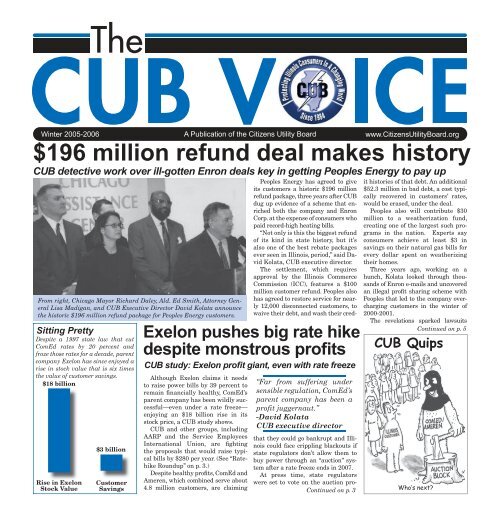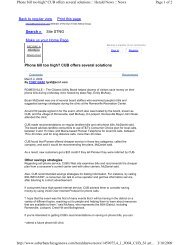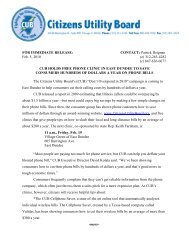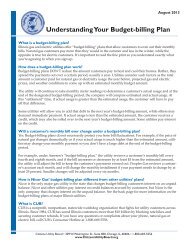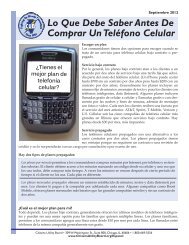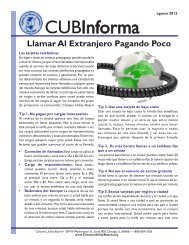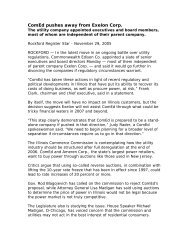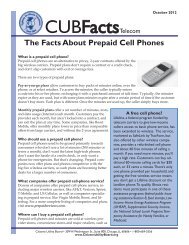the current edition - Citizens Utility Board
the current edition - Citizens Utility Board
the current edition - Citizens Utility Board
You also want an ePaper? Increase the reach of your titles
YUMPU automatically turns print PDFs into web optimized ePapers that Google loves.
Winter 2005-2006 A Publication of <strong>the</strong> <strong>Citizens</strong> <strong>Utility</strong> <strong>Board</strong> www.<strong>Citizens</strong><strong>Utility</strong><strong>Board</strong>.org<br />
$196 million refund deal makes history<br />
CUB detective work over ill-gotten Enron deals key in getting Peoples Energy to pay up<br />
From right, Chicago Mayor Richard Daley, Ald. Ed Smith, Attorney General<br />
Lisa Madigan, and CUB Executive Director David Kolata announce<br />
<strong>the</strong> historic $196 million refund package for Peoples Energy customers.<br />
Sitting Pretty<br />
Despite a 1997 state law that cut<br />
ComEd rates by 20 percent and<br />
froze those rates for a decade, parent<br />
company Exelon has since enjoyed a<br />
rise in stock value that is six times<br />
<strong>the</strong> value of customer savings.<br />
$18 billion<br />
Rise in Exelon<br />
Stock Value<br />
$3 billion<br />
Customer<br />
Savings<br />
Exelon pushes big rate hike<br />
despite monstrous profits<br />
CUB study: Exelon profit giant, even with rate freeze<br />
Although Exelon claims it needs<br />
to raise power bills by 39 percent to<br />
remain financially healthy, ComEd’s<br />
parent company has been wildly successful—even<br />
under a rate freeze—<br />
enjoying an $18 billion rise in its<br />
stock price, a CUB study shows.<br />
CUB and o<strong>the</strong>r groups, including<br />
AARP and <strong>the</strong> Service Employees<br />
International Union, are fighting<br />
<strong>the</strong> proposals that would raise typical<br />
bills by $280 per year. (See “Ratehike<br />
Roundup” on p. 3.)<br />
Despite healthy profits, ComEd and<br />
Ameren, which combined serve about<br />
4.8 million customers, are claiming<br />
“Far from suffering under<br />
sensible regulation, ComEd’s<br />
parent company has been a<br />
profit juggernaut.”<br />
-David Kolata<br />
CUB executive director<br />
that <strong>the</strong>y could go bankrupt and Illinois<br />
could face crippling blackouts if<br />
state regulators don’t allow <strong>the</strong>m to<br />
buy power through an “auction” system<br />
after a rate freeze ends in 2007.<br />
At press time, state regulators<br />
were set to vote on <strong>the</strong> auction pro-<br />
Continued on p. 3<br />
Peoples Energy has agreed to give<br />
its customers a historic $196 million<br />
refund package, three years after CUB<br />
dug up evidence of a scheme that enriched<br />
both <strong>the</strong> company and Enron<br />
Corp. at <strong>the</strong> expense of consumers who<br />
paid record-high heating bills.<br />
“Not only is this <strong>the</strong> biggest refund<br />
of its kind in state history, but it’s<br />
also one of <strong>the</strong> best rebate packages<br />
ever seen in Illinois, period,” said David<br />
Kolata, CUB executive director.<br />
The settlement, which requires<br />
approval by <strong>the</strong> Illinois Commerce<br />
Commission (ICC), features a $100<br />
million customer refund. Peoples also<br />
has agreed to restore service for nearly<br />
12,000 disconnected customers, to<br />
waive <strong>the</strong>ir debt, and wash <strong>the</strong>ir credit<br />
histories of that debt. An additional<br />
$52.3 million in bad debt, a cost typically<br />
recovered in customers’ rates,<br />
would be erased, under <strong>the</strong> deal.<br />
Peoples also will contribute $30<br />
million to a wea<strong>the</strong>rization fund,<br />
creating one of <strong>the</strong> largest such programs<br />
in <strong>the</strong> nation. Experts say<br />
consumers achieve at least $3 in<br />
savings on <strong>the</strong>ir natural gas bills for<br />
every dollar spent on wea<strong>the</strong>rizing<br />
<strong>the</strong>ir homes.<br />
Three years ago, working on a<br />
hunch, Kolata looked through thousands<br />
of Enron e-mails and uncovered<br />
an illegal profit sharing scheme with<br />
Peoples that led to <strong>the</strong> company overcharging<br />
customers in <strong>the</strong> winter of<br />
2000-2001.<br />
The revelations sparked lawsuits<br />
Continued on p. 5<br />
CUB Quips<br />
Who‛s next?
From <strong>the</strong> desk of...<br />
Natural gas industry should make a few New Year’s resolutions<br />
David Kolata<br />
When oil executives<br />
appeared<br />
before Congress<br />
to answer questions<br />
about skyrocketing<br />
gasoline<br />
prices—and <strong>the</strong>ir<br />
skyrocketing profits,<br />
<strong>the</strong>y might as well have been<br />
speaking about <strong>the</strong> outrageous<br />
heating prices.<br />
Those same oil barons also are<br />
making a killing off <strong>the</strong> recordhigh<br />
natural gas prices.<br />
Collectively, <strong>the</strong> five companies<br />
that were paraded before Congress<br />
by some PR-savvy politicians in<br />
November made about $30 billion<br />
in <strong>the</strong> third quarter alone. Of that,<br />
Exxon Mobil’s $9.9 billion set an<br />
American record.<br />
Despite those lofty profits, <strong>the</strong><br />
executives didn’t leap at a bipartisan<br />
suggestion that <strong>the</strong>y donate 10<br />
percent of <strong>the</strong>ir profits to an anemic<br />
federal fund that helps low-income<br />
people pay for winter heat.<br />
Not surprising from <strong>the</strong> gang<br />
that gives <strong>the</strong> same, tired “supply<br />
and demand” excuse for high pric-<br />
es in <strong>the</strong> energy industry.<br />
Of course, <strong>the</strong>re’s a convenient<br />
twist this year to that old line: <strong>the</strong><br />
hurricanes. Yet, while Katrina and<br />
Rita had a devastating impact along<br />
<strong>the</strong> Gulf Coast, where about 20 percent<br />
of <strong>the</strong> nation’s natural gas is<br />
produced, <strong>the</strong> prices had been climbing<br />
for years and reached record levels<br />
before those twin tragedies hit.<br />
In Illinois, <strong>the</strong> utilities that buy<br />
<strong>the</strong> natural gas produced by <strong>the</strong> big<br />
producers and marketers also wash<br />
<strong>the</strong>ir hands of <strong>the</strong> high prices. True,<br />
under state law utilities like Ameren<br />
and Nicor Gas aren’t supposed to<br />
profit off <strong>the</strong> high prices, but Illinois<br />
residents can be forgiven for <strong>the</strong>ir<br />
skepticism.<br />
Both Nicor and Peoples Energy<br />
have been caught in schemes that<br />
overcharged customers during <strong>the</strong> last<br />
high-priced winter five years ago.<br />
Nor<strong>the</strong>rn Illinois residents could<br />
choose a company o<strong>the</strong>r than Nicor<br />
or Peoples to supply <strong>the</strong>m with gas,<br />
but that’s likely to be a bad gamble.<br />
A CUB study found that consumers<br />
were more likely to lose money with<br />
<strong>the</strong>se alternative suppliers, and, as<br />
prices shot up, at least one company<br />
Round 3! SBC has new<br />
phone deregulation plan<br />
For <strong>the</strong> third time in four years,<br />
SBC is pushing to deregulate local<br />
telephone service and open <strong>the</strong> door<br />
for unlimited rate hikes on basic residential<br />
phone service.<br />
In November, SBC declared <strong>the</strong><br />
Chicago phone market, a 123-mile<br />
area in nor<strong>the</strong>astern Illinois, “competitive,”<br />
which means, under state<br />
phone rules, that it can raise rates<br />
for basic phone service as high as it<br />
wants. At press time, CUB planned<br />
to challenge that declaration before<br />
<strong>the</strong> Illinois Commerce Commission<br />
(ICC), and argue that <strong>the</strong> move would<br />
hurt typical phone callers who rely on<br />
SBC’s standard, regulated rates.<br />
SBC claims <strong>the</strong>re’s no need for<br />
state regulations to keep phone rates<br />
down, since <strong>the</strong>re’s plenty of competition.<br />
The company complains that<br />
Continued on p. 6<br />
2<br />
SBC’s Standard Rates<br />
CUB wants to stop SBC in its push<br />
to declare Chicago’s phone market<br />
“competitive,” which would allow<br />
it to raise its standard rates without<br />
state approval. For most SBC<br />
customers those rates are <strong>the</strong> best<br />
deal—along with ano<strong>the</strong>r company’s<br />
long-distance/local toll plan<br />
for 5 cents a minute or less.<br />
Line charge of $2.55, $5.53, or<br />
$9, depending on where you live.<br />
Federal Access Charge of $4.50.<br />
3 cents per local call (0-15 miles<br />
away).<br />
Local calls capped at $10.11 per<br />
month (337 calls).<br />
has bailed out of its supposedly airtight<br />
deal offering a “fixed rate.”<br />
Yes, <strong>the</strong> natural gas industry is<br />
quite a mess. Just ask a working<br />
mo<strong>the</strong>r and fa<strong>the</strong>r trying to pay home<br />
heating bills AND afford <strong>the</strong>ir daughter’s<br />
braces—or a retiree on a fixed<br />
income who has to budget for food,<br />
prescription medicine, and utilities.<br />
They’d love to hear some New<br />
Year’s resolutions from <strong>the</strong> gas industry.<br />
First, <strong>the</strong> utilities should aggressively<br />
promote <strong>the</strong>ir “budget” plans,<br />
which even out gas bills on an annual<br />
basis. They also should offer a<br />
percentage-of-income payment plan<br />
that would allow low-income customers<br />
to pay what <strong>the</strong>y can afford each<br />
month and reduce <strong>the</strong> number of<br />
customers who default on <strong>the</strong>ir bills.<br />
Plus, it would be nice to see <strong>the</strong> utilities<br />
offer a lower, alternative “fixedrate”<br />
for gas.<br />
Add to that an emergency federal<br />
income tax credit for people struggling<br />
to pay <strong>the</strong>ir bills and a wellfunded<br />
wea<strong>the</strong>rization program,<br />
complete with discounted programmable<br />
<strong>the</strong>rmostats or water-heater<br />
covers at big hardware chains.<br />
Also, <strong>the</strong> Illinois Commerce Commission<br />
(ICC) should immediately<br />
launch an investigation to determine<br />
<strong>the</strong> best hedging practices—or<br />
gas-buying strategies designed to<br />
protect consumers from rate shock.<br />
While <strong>the</strong>y’re at it, <strong>the</strong> ICC should<br />
probe <strong>the</strong> troubling price disparity<br />
between utilities. Just why was <strong>the</strong>re<br />
a 12-cent difference in <strong>the</strong> November<br />
per-<strong>the</strong>rm price of Nicor ($1.19) and<br />
AmerenCILCO ($1.07)?<br />
These are just initial steps. Our<br />
biggest wish is for a total overhaul<br />
of <strong>the</strong> gas industry with federal regulators<br />
taking a much more active<br />
role in policing <strong>the</strong> business and<br />
preventing market manipulation.<br />
That would take years of brutal<br />
policy debates and a federal government<br />
willing to stand up to <strong>the</strong><br />
companies that are profiting from<br />
<strong>the</strong> <strong>current</strong> system.<br />
Improbable, perhaps, but how<br />
long will this chaos be business<br />
as usual in <strong>the</strong> gas industry? The<br />
<strong>current</strong> laissez-faire system only<br />
benefits <strong>the</strong> Exxon Mobils of <strong>the</strong><br />
world—whose executives can jet off<br />
to a warm-wea<strong>the</strong>r paradise if <strong>the</strong>y<br />
ever need to escape <strong>the</strong> winter cold.<br />
Former Rockford mayor<br />
named new ICC chairman<br />
CUB applauds governor’s new pick<br />
Chairman<br />
Box<br />
commissions, including <strong>the</strong> Illinois<br />
Children’s Healthcare Foundation.<br />
“It is key that <strong>the</strong> ICC chairman be<br />
a leader with a firm grasp of <strong>the</strong> law<br />
and a firm grasp of <strong>the</strong> interests of all<br />
Illinois residents, not just utility executives,”<br />
CUB Executive Director David<br />
Commission<br />
Kolata said. “Chairman Box has all of<br />
those qualifications as he prepares to<br />
tackle <strong>the</strong> difficult cases ahead.”<br />
Among <strong>the</strong> problems facing Illinois<br />
consumers, natural gas prices are at<br />
record levels and electric utilities are<br />
seeking hundreds of millions of dollars<br />
in rate hikes.<br />
In January, <strong>the</strong> governor named<br />
Cohen his first director of consumer<br />
affairs. He will advise <strong>the</strong> governor<br />
on consumer issues ranging from energy<br />
policy to privacy protection.<br />
The CUB Voice<br />
Gov. Rod Blagojevich<br />
has nominated<br />
former Rockford<br />
Mayor Charles Box<br />
to be <strong>the</strong> chairman<br />
of <strong>the</strong> Illinois Commerce<br />
(ICC).<br />
The move came<br />
two months after<br />
utility companies blocked <strong>the</strong> governor’s<br />
first pick, former CUB Executive<br />
Director Martin Cohen.<br />
In November, Cohen became <strong>the</strong><br />
first nominee ever to be rejected by<br />
<strong>the</strong> Illinois Senate. Box still must get<br />
confirmed by <strong>the</strong> Senate.<br />
Box, Rockford’s first black mayor,<br />
from 1989 to 2001, is an attorney<br />
who serves on several boards and
CUB study: Exelon a profit giant now and in <strong>the</strong> future<br />
Continued from p. 1<br />
posal. CUB will appeal any vote<br />
against consumers.<br />
A wide spectrum of critics—from<br />
Gov. Rod Blagojevich to a former Reagan<br />
Administration economist—have<br />
said an auction would lead to unreasonably<br />
high rates. After conducting<br />
similar auctions, New Jersey’s rates<br />
increased by 28 percent and Ohio<br />
was so unhappy with <strong>the</strong> outcome<br />
that it did away with <strong>the</strong> system.<br />
Although Illinois law mandates that<br />
utilities buy power at <strong>the</strong> least cost<br />
possible, <strong>the</strong> consultant who designed<br />
<strong>the</strong> auction for Exelon admitted in testimony<br />
before <strong>the</strong> Illinois Commerce<br />
Commission (ICC) that producing <strong>the</strong><br />
lowest price isn’t an auction goal.<br />
In fact, <strong>the</strong> auction would all but<br />
end <strong>the</strong> authority of Illinois regulators<br />
to ensure that rates are fair, opening<br />
<strong>the</strong> door for unlimited rate hikes.<br />
Yet, under <strong>current</strong> regulation, Exelon<br />
has been a profit giant—even<br />
with a 20 percent rate cut and freeze<br />
implemented by <strong>the</strong> 1997 state law<br />
that restructured <strong>the</strong> power industry,<br />
a CUB study found.<br />
Study author Edward Bodmer, a<br />
Take Action<br />
former ICC staffer and vice president<br />
of <strong>the</strong> First National Bank of Chicago,<br />
found that Exelon’s stock value<br />
has jumped by $18 billion since 1997,<br />
and its 21 percent return on investment<br />
beats all o<strong>the</strong>r major utilities<br />
across <strong>the</strong> country.<br />
In fact, <strong>the</strong> utility has outperformed<br />
<strong>the</strong> S&P 500, a stock market barometer,<br />
by more than 1,500 percent.<br />
The future also looks bright for Exelon.<br />
Even under a rate freeze or cut,<br />
its profit rate would remain far above<br />
<strong>the</strong> average return on equity of about<br />
10 percent allowed for electric utilities<br />
by o<strong>the</strong>r regulatory commissions.<br />
Under a rate freeze, Bodmer projects<br />
Exelon’s profit rate would hover between<br />
18 and 19 percent through 2012.<br />
With a 5 percent rate cut, <strong>the</strong> profit rate<br />
would be around 17 percent.<br />
“Far from suffering under sensible<br />
regulation, ComEd’s parent company<br />
has been a profit juggernaut,”<br />
CUB Executive Director David Kolata<br />
said. “Simply put, Exelon wants<br />
ComEd to become a deregulated<br />
monopoly—making obscene profits<br />
while wiping out meaningful regulation<br />
in Illinois.”<br />
Rate-hike Roundup<br />
A summary of <strong>the</strong> three Exelon/ComEd rate-hike proposals—totalling 39<br />
percent—before state or federal regulators.<br />
Potential<br />
Rate Hike<br />
Case<br />
(39% total) Update<br />
Delivery rate hike.<br />
(Dispute over what ComEd<br />
should charge customers to<br />
deliver power.)<br />
Auction case.<br />
(Dispute over how ComEd<br />
will buy power in 2007.)<br />
Federal rate hike.<br />
(Dispute before federal<br />
regulators over plan to<br />
raise wholesale rates.)<br />
6% CUB and <strong>the</strong> Illinois Attorney General’s<br />
office filed testimony with Illinois Commerce<br />
Commission (ICC) to wipe out<br />
proposed increase—and give customers<br />
a rate cut of at least $115 million. An<br />
ICC ruling is expected by end of July.<br />
16% At press time, a ruling on <strong>the</strong> case was<br />
expected by end of January. CUB will<br />
appeal any anti-consumer ruling.<br />
17% CUB has joined with consumer advocates<br />
to argue against wholesale rate<br />
increases before <strong>the</strong> Federal Energy<br />
Regulatory Commission (FERC). Federal<br />
ruling expected by end of 2006.<br />
Breaking news: Rate-hike plans revealed<br />
ComEd and Ameren propose hundreds<br />
of millions of dollars in rate<br />
hikes—on top of <strong>the</strong> increases <strong>the</strong>ir<br />
“auction” plans would bring.<br />
The proposed increases are to “delivery-service<br />
tariff” (DST) rates—<br />
what utilities can charge customers<br />
to deliver power to <strong>the</strong>ir homes.<br />
ComEd proposes a $350 million<br />
Fact vs. Fiction<br />
Your guide to ComEd’s claims<br />
CUB Executive Director David Kolata<br />
announces an ad campaign to answer<br />
ComEd’s misleading claims.<br />
In hopes of securing nearly $1<br />
billion in rate hikes, ComEd and its<br />
parent company, Exelon, have been<br />
spreading misinformation through<br />
a front group called CORE and a<br />
$4 million TV campaign.<br />
What follows is an analysis by<br />
CUB of arguments made by ComEd<br />
over <strong>the</strong> past several months to justify<br />
a 39 percent increase in power<br />
bills.<br />
ComEd Claim: If we don’t get<br />
a rate hike, we could go bankrupt<br />
and Illinois could suffer widespread<br />
power outages, similar to<br />
<strong>the</strong> crisis California endured several<br />
years ago.<br />
CUB Analysis: Illinois has so<br />
many power plants that we export<br />
electricity to o<strong>the</strong>r states. Talk of<br />
ComEd bankruptcy ignores <strong>the</strong><br />
fact that its parent company, Exelon,<br />
had a record profit of $1.9 billion<br />
in 2004, and analysts predict<br />
it will continue to flourish even if<br />
rates are frozen. While Exelon says<br />
it absolutely needs higher rates in<br />
Illinois, it sings a different tune in<br />
Pennsylvania, where it locked in a<br />
$120 million rate cut through <strong>the</strong><br />
increase in DST rates. Ameren—<br />
<strong>the</strong> parent of AmerenCILCO, AmerenCIPS,<br />
and AmerenIP—proposes<br />
three separate “DST” rate hikes totalling<br />
$200 million.<br />
CUB has proposed wiping out<br />
Exelon’s rate hike, and <strong>the</strong> consumer<br />
group is studying <strong>the</strong> Ameren<br />
proposal.<br />
end of <strong>the</strong> decade.<br />
ComEd Claim: Our rates are <strong>the</strong><br />
same today as <strong>the</strong>y were in 1995.<br />
No company can be expected to go<br />
so long without raising prices.<br />
CUB Analysis: Just because<br />
ComEd hasn’t had an increase<br />
doesn’t mean it automatically deserves<br />
one. Its customers used to<br />
pay some of <strong>the</strong> highest rates in<br />
<strong>the</strong> nation, before a 1997 state law<br />
ordered a 20 percent rate cut. It<br />
took a record rate cut just to get<br />
ComEd’s prices at roughly <strong>the</strong> Midwest<br />
average, and yet <strong>the</strong> company<br />
still is raking in record profits.<br />
ComEd Claim: Our “auction”<br />
plan does NOT limit state oversight<br />
of <strong>the</strong> power industry.<br />
CUB Analysis: ComEd’s plan<br />
is a radical departure from <strong>current</strong><br />
law, which requires <strong>the</strong> Illinois<br />
Commerce Commission (ICC)<br />
to ensure that rates are “just and<br />
reasonable.” The proposal would<br />
strip <strong>the</strong> ICC of any meaningful<br />
power to make sure consumers are<br />
charged a fair rate.<br />
ComEd Claim: Consumer<br />
groups that oppose an “auction”<br />
system have not proposed any alternatives.<br />
CUB Analysis: Consumer<br />
groups have said all along that<br />
ComEd can have its auction, or<br />
any o<strong>the</strong>r power-buying system it<br />
wants, as long as Illinois regulators<br />
retain <strong>the</strong> authority to assure<br />
fair rates. ComEd’s auction is just<br />
a clever way to lift reasonable regulations<br />
that for years have allowed<br />
<strong>the</strong> company to earn a healthy<br />
profit while protecting consumers.<br />
Contact your state legislators and urge <strong>the</strong>m to take consumer-friendly positions<br />
on utility issues. To be connected directly to your legislator’s office,<br />
call AARP’s electrical advocacy hotline, 1-800-719-3020, or log on to www.<br />
StopComEdRateHike.com. Ameren has similar proposals. Find out more at<br />
www.StopAmerenRateHike.com.<br />
Winter 2005-2006 3
Historically bad—again<br />
Natural gas industry in 2005 broke<br />
price records for third straight year<br />
Steady rise<br />
The natural gas industry likes to<br />
blame <strong>the</strong> high prices on Hurricanes<br />
Katrina and Rita, but <strong>the</strong><br />
average monthly per-<strong>the</strong>rm price<br />
offered by five major Illinois utilities<br />
was at record levels long before<br />
those twin tragedies in 2005.<br />
32¢<br />
47¢<br />
Tips on avoiding a few natural gas nightmares<br />
Malinowski<br />
Record!<br />
Record!<br />
52¢<br />
43¢<br />
Record!<br />
62¢<br />
68¢<br />
84¢<br />
1999<br />
’00 ‘01 ‘02 ‘03 ‘04 2005<br />
Source: This decade’s average monthly prices<br />
for AmerenCILCO, AmerenCIPS, AmerenIP,<br />
Nicor Gas, and Peoples Gas.<br />
The Nightmare:<br />
Colleen and Steven<br />
Malinowski’s gas<br />
company doesn’t read<br />
<strong>the</strong> meter for months<br />
at a time. The utility<br />
once sent <strong>the</strong> Elmwood<br />
Park family a<br />
$1,500 make-up bill after underestimating<br />
gas usage for months. Ano<strong>the</strong>r<br />
time it sent a $1,600 make-up<br />
bill. “How many times do you have<br />
to call and wait for <strong>the</strong>m to come before<br />
you just give up,” said Colleen,<br />
a mo<strong>the</strong>r of three. The utility had<br />
failed to make about 15 meter-reading<br />
appointments, she said.<br />
Tip:<br />
Read each bill to see if it is based<br />
on an “actual” or “estimated” meter<br />
reading. If a bill hasn’t been read for<br />
two straight months, call <strong>the</strong> company<br />
to find out why. Be persistent.<br />
Call your utility and ask if it allows<br />
customers to do <strong>the</strong>ir own readings.<br />
4<br />
For <strong>the</strong> third consecutive year, Illinois<br />
consumers endured <strong>the</strong> worst<br />
natural gas rates in state history,<br />
and <strong>the</strong>y are bracing for punishing<br />
prices <strong>the</strong> rest of <strong>the</strong> winter.<br />
Five major utilities—AmerenCIL-<br />
CO, AmerenCIPS, AmerenIP, Nicor<br />
Gas, and Peoples Gas—beat price records<br />
in at least eight months in 2005.<br />
The average monthly price for<br />
those utilities was <strong>the</strong> highest in Illinois<br />
history. Meanwhile, gas producers<br />
and marketers made huge profits.<br />
(See CUB Executive Director David<br />
Kolata’s column on p. 2.)<br />
At press time, <strong>the</strong> prices were still<br />
at record levels, with an average January<br />
price of $1.10 per <strong>the</strong>rm.<br />
CUB has asked state regulators<br />
to consider several actions, including<br />
allowing low-income customers<br />
to pay a certain percentage of <strong>the</strong>ir<br />
bills, according to <strong>the</strong>ir income, to<br />
survive <strong>the</strong> record prices without<br />
getting <strong>the</strong>ir heat turned off.<br />
CUB also asked regulators to probe<br />
why <strong>the</strong>re are sometimes wide price<br />
differences between <strong>the</strong> utilities.<br />
The Nightmare:<br />
Russell Ponder, of<br />
Homewood, thought<br />
he could save money<br />
on Nicor’s “Fixed Bill”<br />
program. But CUB has<br />
found that <strong>the</strong> fixed<br />
Ponder<br />
monthly bill offered to<br />
customers contains such a large markup<br />
that <strong>the</strong>y’re likely to pay much<br />
more than on standard rates. Ponder<br />
overpaid by hundreds of dollars, CUB<br />
found. “There’s no free lunch,” he said.<br />
Tip:<br />
Beware of any plan that seems to<br />
promise savings. Join your utility’s<br />
“budget plan,” which is different from<br />
<strong>the</strong> “Fixed Bill” plan. A budget plan estimates<br />
your usage for <strong>the</strong> next year<br />
and evens out monthly bills. At <strong>the</strong><br />
end of <strong>the</strong> year, <strong>the</strong> utility credits your<br />
account for overestimating your usage,<br />
or charges you for underestimating it.<br />
With <strong>the</strong> “Fixed Bill” plan, you’re simply<br />
out <strong>the</strong> money you overpaid.<br />
Just how bad is bad?<br />
The average monthly prices charged by major Illinois gas utilities were<br />
at all-time highs in 2005, marking <strong>the</strong> third straight year <strong>the</strong> companies<br />
smashed records.<br />
Nicor Gas<br />
2005—85.4 cents/<strong>the</strong>rm<br />
2004—64.6 cents/<strong>the</strong>rm<br />
Peoples Gas<br />
2005—86.8 cents/<strong>the</strong>rm<br />
2004—67.6 cents/<strong>the</strong>rm<br />
AmerenCILCO<br />
2005—79.9 cents/<strong>the</strong>rm<br />
2004—63.8 cents/<strong>the</strong>rm<br />
AmerenCIPS<br />
2005—87.6 cents/<strong>the</strong>rm<br />
2004—73.6 cents/<strong>the</strong>rm<br />
AmerenIP<br />
2005—79.6 cents/<strong>the</strong>rm<br />
2004—69.5 cents/<strong>the</strong>rm<br />
Ariel<br />
The Nightmare:<br />
Glen Ariel said he<br />
didn’t realize he was<br />
paying for something<br />
he didn’t need. Nicor’s<br />
$4 per month “Comfort<br />
Guard” plan covers repairs<br />
to exposed gas<br />
pipes, including <strong>the</strong> connector that<br />
links appliances to <strong>the</strong> main gas line.<br />
But it doesn’t cover many o<strong>the</strong>r repairs,<br />
and renters probably don’t need<br />
it, since landlords should handle such<br />
problems. Ariel was refunded <strong>the</strong> $94<br />
he had spent on <strong>the</strong> program, after<br />
CUB helped him argue that he didn’t<br />
need it since his gas stove had a new<br />
connector. “I’m not a senile old goof,”<br />
<strong>the</strong> 74-year-old Ariel said. “I couldn’t<br />
even begin to guess how many seniors<br />
are being scammed by this thing.”<br />
Tip:<br />
Read your bills carefully. Beware of<br />
strange charges, and call CUB for an<br />
explanation of <strong>the</strong> different fees.<br />
% increase<br />
32%<br />
28%<br />
25%<br />
19%<br />
15%<br />
The Nightmare:<br />
John Zager, of Chicago<br />
Heights, said <strong>the</strong><br />
man at <strong>the</strong> door gave<br />
<strong>the</strong> impression that<br />
he was from Nicor<br />
Gas. The man asked<br />
Zager<br />
for his bill to see if <strong>the</strong><br />
68-year-old retiree was eligible for any<br />
savings. Then he asked Zager to sign a<br />
form. “Wait a minute. I’m not signing<br />
anything,” Zager said. The man wasn’t<br />
from Nicor. O<strong>the</strong>r companies are allowed<br />
to compete with Nicor through<br />
<strong>the</strong> “Customer Select” program, which<br />
allows customers to choose a gas supplier<br />
o<strong>the</strong>r than <strong>the</strong>ir utility. Call CUB<br />
if you have complaints about <strong>the</strong> sales<br />
tactics of <strong>the</strong>se suppliers.<br />
Tip:<br />
Never give personal information to<br />
anyone who claims to be from <strong>the</strong><br />
“gas company.” Don’t sign anything<br />
until you identify <strong>the</strong> company and<br />
carefully read its “deal” in writing.<br />
The CUB Voice
Pop Quiz!<br />
So how well do you<br />
know your gas bill?<br />
Quiz<br />
Class: Gas Bill 101<br />
Teacher: Mr. Kolata<br />
Name:<br />
Homeroom:<br />
It’s not just for<br />
‘tree-huggers’<br />
Getting <strong>the</strong> natural gas bill<br />
Section I: Multiple Choice 2. Which charge makes up most of<br />
is kind of like getting slapped 1. What does “EST” mean on your your gas bill?<br />
Julia Ortiz, a 42-year-old factory<br />
with one of those pop quizzes<br />
we used to endure in high<br />
er of two, is always looking to save as<br />
bill?<br />
A. Purchased Gas Adjustment (PGA)<br />
worker from Cicero and single moth-<br />
A. Established Account<br />
B. Monthly customer charge<br />
B. Estimated Reading<br />
C. Distribution charge<br />
much money as possible.<br />
school: <strong>the</strong>y’re filled with a lot C. Environmental Systems Therm Fee D. Environmental Recovery Cost<br />
D. Energy State Tax<br />
“My bills are too high,” said Julia.<br />
of confusing words and numbers—and<br />
<strong>the</strong>y’re never wel-<br />
3. Natural gas usage is billed by cleaning up pollution at old gas<br />
I’m scared of what is going to hap-<br />
4. This charge covers <strong>the</strong> costs of<br />
“I’m afraid to open my mail because<br />
come. Well, here’s a relatively what unit of measurement?<br />
manufacturing sites.<br />
pen.”<br />
A. The kilowatt-hour<br />
A. Environmental Systems Therm Fee<br />
painless pop quiz to help you<br />
The average American household<br />
B. Cubic feet<br />
B. Environmental Recovery Cost<br />
spends $1,500 annually on energy<br />
better understand those bills. C. The <strong>the</strong>rm<br />
C. Distribution Maintenance Charge<br />
D. The deca<strong>the</strong>rm<br />
D. Monthly customer charge<br />
bills, a number that could increase by<br />
Don’t worry, we supply <strong>the</strong> answers<br />
on p. 7—and you won’t be Section II: True or False<br />
federal government. Because half of<br />
50 percent this year, according to <strong>the</strong><br />
sent to <strong>the</strong> principal’s office for<br />
5. The customer charge (a.k.a. basic 6. The amount you pay for distribution<br />
costs changes from month to<br />
those costs go toward heating and cooling<br />
homes, basic home improvements<br />
service charge or account charge)<br />
peeking.<br />
changes from month to month, depending<br />
on how much gas you use. you use.<br />
and more efficient equipment can lead<br />
month, depending on how much gas<br />
to lower costs.<br />
Section III: Matching<br />
Julia called CUB to learn how she<br />
7. Natural gas and oil producers made huge profits in <strong>the</strong> third quarter of could make her home more energy<br />
Grade your Performance<br />
2005, while consumers paid record-high gasoline and heating prices. Match efficient. With natural gas prices at<br />
0-3 Correct—Don’t worry, you’re<br />
<strong>the</strong> company to <strong>the</strong> third-quarter earnings.<br />
record highs and December temperatures<br />
at record lows, CUB is showing<br />
not alone. Call CUB for a free<br />
BP Plc.<br />
$9 Billion<br />
copy of “Making Sense of Your<br />
consumers how to save energy and<br />
Gas Bill.”<br />
Chevron Corp.<br />
$6.5 Billion<br />
reduce <strong>the</strong>ir heating bills.<br />
4-5 Correct—Not bad, but<br />
One of <strong>the</strong> most effective ways to<br />
<strong>the</strong>re’s room for improvement.<br />
ConocoPhillips<br />
$3.6 Billion<br />
save energy is to prevent warm air<br />
6-7 Correct—Impressive! You’ve<br />
from leaving <strong>the</strong> house. Wea<strong>the</strong>rstrips<br />
and insulation should be add-<br />
mastered that mysterious language<br />
Exxon Mobil Corp.<br />
$3.8 Billion<br />
called “Gas Bill-ese.”<br />
Royal Dutch Shell Plc.<br />
$9.9 Billion (American Record!)<br />
ed to an attic hatch or door. Holes<br />
from ducts and plumbing or electrical<br />
runs that lead to <strong>the</strong> attic should<br />
be sealed. Doors and windows should<br />
Road to $196 million refund<br />
be caulked. Insulation can be added<br />
Historic Refund<br />
in <strong>the</strong> walls and ceiling to prevent<br />
A breakdown of <strong>the</strong> $196 million refund<br />
package for Peoples Gas and The furnace filter should be re-<br />
heat loss.<br />
package began with CUB<br />
Continued from p. 1<br />
North Shore Gas customers.<br />
possible choice between heating or<br />
placed regularly because a dirty air<br />
from <strong>the</strong> City of Chicago and <strong>the</strong> Illinois<br />
Attorney General’s office. They or Richard Daley and Attorney Gen-<br />
Customers will receive a $50 credit unit work harder, wasting energy<br />
eating,” Kolata said. “Thanks to May-<br />
$100 Million Credit.<br />
filter reduces airflow and makes <strong>the</strong><br />
also joined CUB in asking <strong>the</strong> ICC to eral Lisa Madigan, this settlement as early as March and an additional<br />
$50 credit within 12 months. Set <strong>the</strong> water heater to <strong>the</strong> warm<br />
and money.<br />
order a big refund.<br />
will give consumers<br />
some relief.”<br />
setting, 120 degrees. Cover <strong>the</strong> wa-<br />
However, any “Too many customers face<br />
relief ordered by <strong>the</strong> impossible choice between<br />
heating or eating....<br />
Under <strong>the</strong> proposed<br />
agreement, Customers save at least $3 for every an insulating blanket, which will<br />
$30 Million Wea<strong>the</strong>rization Program. ter heater, not <strong>the</strong> <strong>the</strong>rmostat, with<br />
a civil court or<br />
<strong>the</strong> ICC was likely<br />
to be delayed<br />
average about <strong>the</strong> value exceed <strong>the</strong> funding. if your utility company will pro-<br />
<strong>the</strong> credits, which $1 spent on wea<strong>the</strong>rization, making pay for itself within <strong>the</strong> year. See<br />
This settlement will give<br />
for months, even<br />
consumers some relief.” $100 per household,<br />
would go to<br />
vide <strong>the</strong>se at a discount or offer a<br />
years, by legal -David Kolata<br />
$14 Million to Turn on Gas. rebate.<br />
challenges. CUB executive director Peoples Gas and<br />
Customers disconnected for nonpayment<br />
will have <strong>the</strong>ir debt forgiven than 68 degrees during <strong>the</strong> day and<br />
A furnace should be set no higher<br />
The $196 million<br />
North Shore Gas<br />
settlement gets substantial benefits customers in two installments. The<br />
and <strong>the</strong>ir reconnection fees waived. 62 degrees at night. Consumers can<br />
to customers quickly, before <strong>the</strong> end first $50 credit would come within a<br />
save two percent of <strong>the</strong>ir heating<br />
$52 Million to Forgive Bad Debts.<br />
of a winter heating season that has month of being approved by <strong>the</strong> ICC.<br />
bills for each degree <strong>the</strong>y turn down<br />
This amount, usually built into<br />
seen record-high natural gas prices. The second would come within a year<br />
<strong>the</strong>ir <strong>the</strong>rmostats. However, senior<br />
consumers’ rates, will be erased.<br />
“Too many customers face <strong>the</strong> im-<br />
of that.<br />
Continued on p. 6<br />
Winter 2005-2006 5
6<br />
Schadenfreude...If <strong>the</strong>re’s any<br />
doubt about how fearful utility interests<br />
were at <strong>the</strong> prospect of former<br />
CUB leader Martin Cohen as<br />
Illinois’ top utility regulator, take<br />
a look at how Wall Street partied<br />
on <strong>the</strong> day of his ouster. Cohen<br />
became <strong>the</strong> first nominee ever to<br />
be rejected by <strong>the</strong> state Senate.<br />
ComEd’s parent company, Exelon,<br />
engineered Cohen’s demise—and<br />
was rewarded with a 71-cent jump<br />
in its stock. “Good news,” said one<br />
investment analyst.<br />
Seems like old times…The<br />
judge who broke up phone giant<br />
AT&T 20 years ago died in 2000,<br />
but he still had something to say<br />
about an SBC-AT&T merger. “I’m<br />
surprised that somebody wants to<br />
put Humpty Dumpty back toge<strong>the</strong>r,”<br />
Judge Harold Greene said in<br />
1997, <strong>the</strong> first time SBC and AT&T<br />
considered merging. Greene worried<br />
of a “return to monopoly conditions.”<br />
That merger failed, but a<br />
new deal just went through. And<br />
what will <strong>the</strong> new giant be called?<br />
You guessed it: AT&T.<br />
I owe what?…CUB has heard<br />
plenty of stories about overcharged<br />
customers, but Rose<br />
Mary Cook’s case is one for <strong>the</strong><br />
ages. The Mascoutah woman<br />
was accused of using 10 million<br />
gallons of water and billed<br />
$74,000 by <strong>the</strong> city’s water department.<br />
The culprit? A broken<br />
meter. Cook’s actual bill was<br />
just $32. Cook joked to The Associated<br />
Press that she couldn’t<br />
have been hoarding water, since<br />
where in <strong>the</strong> world would she<br />
have found all those gallon jugs?<br />
Cost-cutting?...Ameren wants<br />
to cut expenses by $65 million, so<br />
why is CEO Gary Rainwater—<br />
who made $1.2 million in salary<br />
and bonus in 2004—slated to get<br />
a 13 percent salary increase?<br />
Well, Ameren says he receives<br />
below-average pay. Plenty of Illinois<br />
consumers would gladly<br />
settle for Ameren’s definition of<br />
“below average.”<br />
Water torture!<br />
Illinois American customers angered by suddenly outrageous bills<br />
CUB Lawyer Melville Nickerson<br />
is investigating a monstrous jump<br />
in Illinois-American Water bills.<br />
As if high heating bills weren’t<br />
enough, some Illinois consumers<br />
also face skyrocketing water bills,<br />
creating an even deeper dent in <strong>the</strong>ir<br />
pocketbooks.<br />
“I can add my gas and electric bills<br />
toge<strong>the</strong>r and my water bill is still<br />
higher,” said Sandra Walters, an accountant<br />
and long-time resident of<br />
Orland Park. “I would ra<strong>the</strong>r pay my<br />
gas bill twice than have to pay my<br />
Continued from p. 5<br />
citizens or those with health conditions<br />
should consult <strong>the</strong>ir doctors.<br />
Never turn off <strong>the</strong> heat. It will lead<br />
to frozen pipes.<br />
Don’t crank up <strong>the</strong> <strong>the</strong>rmostat<br />
thinking it will warm up <strong>the</strong> house<br />
faster. The house will heat up at <strong>the</strong><br />
same rate, but more energy will be<br />
water bill, and that’s saying a lot.”<br />
Consumers living in Homer Glen,<br />
Orland Township and o<strong>the</strong>r areas<br />
southwest of Chicago saw astronomical<br />
increases in <strong>the</strong>ir water bills after<br />
Illinois American Water installed new<br />
meters over <strong>the</strong> summer. Complaints<br />
about <strong>the</strong> high bills started pouring<br />
into CUB in late August and continued<br />
through <strong>the</strong> end of November.<br />
Summer bills that typically showed<br />
usage of 10,000 to 25,000 gallons<br />
each month suddenly ballooned to<br />
50,000 to 100,000 gallons.<br />
Walters was billed $400 for using<br />
49,000 gallons—more than triple her<br />
typical usage and enough to fill a<br />
500-square foot pool twice over.<br />
Walters insisted <strong>the</strong>re was a mistake,<br />
but Illinois-American stood by<br />
its reading, and, amazingly, claimed<br />
<strong>the</strong> high bill may be due to overzealous<br />
lawn watering during a dry summer.<br />
“We found <strong>the</strong> grass was very green,”<br />
Continued from p. 2<br />
those regulations prevent it from<br />
effectively competing against companies<br />
that offer cell phone plans or<br />
a new technology that carries calls<br />
over <strong>the</strong> Internet.<br />
However, none of <strong>the</strong>se options can<br />
compete with SBC’s standard, regulated<br />
rates, which charge just 3 cents per<br />
call within 15 miles and are capped at<br />
$10.11 a month. A CUB review found<br />
that typical competing offers were<br />
about double <strong>the</strong> price for a caller who<br />
makes 120 local calls, wants one calling<br />
feature, and uses a low-cost plan<br />
from ano<strong>the</strong>r company to make about<br />
25 long-distance calls a month.<br />
“I have to watch every single dollar<br />
that I spend,” said D. Smith, a<br />
Hot tips: Save energy, save money<br />
used, inflating bills.<br />
When buying new home products,<br />
look for ones with an Energy Star<br />
rating. The federal government uses<br />
this label to clearly identify products<br />
that combine high performance<br />
standards with energy efficiency.<br />
Heating and cooling products with<br />
an Energy Star save consumers<br />
<strong>the</strong> company said in a letter.<br />
Illinois American has given o<strong>the</strong>r<br />
excuses for <strong>the</strong> jump in bills, blaming<br />
customers for leaks inside <strong>the</strong>ir homes<br />
and saying that newly installed meters<br />
are much more accurate.<br />
Still, for many customers, <strong>the</strong> increase<br />
is well beyond what is considered<br />
typical monthly usage (about<br />
10,000 gallons) by <strong>the</strong> American Water<br />
Works Association.<br />
CUB Legal Counsel Melville Nickerson<br />
is working with <strong>the</strong> Illinois<br />
Commerce Commission (ICC), Illinois<br />
Attorney General Lisa Madigan’s office,<br />
local governments, and residents<br />
to determine if Illinois American Water<br />
violated any laws. Nickerson plans<br />
to file a complaint with <strong>the</strong> ICC.<br />
In a related development, Rep. Renee<br />
Kosel, of Mokena, has proposed<br />
legislation that would require water<br />
meters to be checked and certified by<br />
an ICC-approved inspector.<br />
SBC pushes to deregulate local phone service<br />
SBC customers, here at a CUB<br />
phone-bill clinic, could pay<br />
higher rates if <strong>the</strong> company is<br />
successful in declaring <strong>the</strong> Chicago<br />
market competitive.<br />
Chicago-area SBC customer. “If<br />
<strong>the</strong>y change <strong>the</strong> rates I won’t like<br />
it. I think <strong>the</strong> whole thing stinks.”<br />
Despite claims of stiff competition,<br />
SBC is still <strong>the</strong> giant in Illinois.<br />
It has devoured its major<br />
competitor (AT&T), and it owns 60<br />
percent of Cingular, <strong>the</strong> nation’s<br />
largest cell phone company.<br />
In 2001 and 2005, CUB helped<br />
block SBC’s efforts before state legislators<br />
to deregulate phone service.<br />
Now, <strong>the</strong> battle is before state regulators,<br />
where CUB will argue that <strong>the</strong><br />
market isn’t sufficiently competitive.<br />
“When it comes to SBC’s standard,<br />
regulated rates, <strong>the</strong>re’s no<br />
competition,” CUB Associate Director<br />
Pat Clark said.<br />
7 percent to 30 percent more than<br />
standard products.<br />
For more tips on energy efficiency,<br />
visit CUB’s website, www.<strong>Citizens</strong><strong>Utility</strong><strong>Board</strong>.org,<br />
and check out <strong>the</strong><br />
“Winter Energy-saving Tips” guide<br />
on <strong>the</strong> “Natural Gas” and “Electric”<br />
pages. You can also call CUB at 1-<br />
800-669-5556 to request a copy.<br />
The CUB Voice
The answers to CUB’s gas-bill pop quiz<br />
1. B, Estimated Reading. Some<br />
utilities use <strong>the</strong> letter “E” or <strong>the</strong> full<br />
word “estimated” to signify that <strong>the</strong>y<br />
did not actually read your gas meter<br />
for this bill, but estimated <strong>the</strong> usage.<br />
The estimate is based on your usage<br />
for <strong>the</strong> same month in <strong>the</strong> previous<br />
year, adjusted for wea<strong>the</strong>r. A utility<br />
could overcharge a customer based on<br />
a bad estimate, or underestimate usage<br />
and later demand a big payment.<br />
Call your utility if it hasn’t taken an<br />
actual reading in two months.<br />
2. A, Purchased Gas Adjustment<br />
(PGA) (a.k.a. <strong>the</strong> cost of gas, natural<br />
gas cost, gas supply charge, gas<br />
charge adjustment). The PGA can<br />
make up 75 percent of your bill. It’s<br />
<strong>the</strong> charge that reflects <strong>the</strong> <strong>current</strong><br />
high gas prices. Each utility announces<br />
what its PGA will be on a monthly<br />
basis, but that rate probably won’t be<br />
reflected on your bill. That’s because<br />
your billing period is likely to cover<br />
Ameren and Exelon/ComEd say <strong>the</strong>y need rate hikes totalling nearly 40<br />
percent to remain financially healthy. However, such claims ignore <strong>the</strong><br />
fact that both companies are incredibly wealthy—so wealthy that <strong>the</strong>y<br />
have given <strong>the</strong>ir CEOs astronomical raises from 1998 to 2004, even while<br />
operating under a state-imposed rate freeze.<br />
Ameren CEO<br />
Gary Rainwater’s<br />
salary/bonus<br />
increase<br />
Exelon CEO<br />
John Rowe’s<br />
salary/bonus<br />
increase<br />
Cost of living<br />
increase<br />
1998-2004<br />
Easy Living<br />
1998:<br />
$418,000<br />
1998:<br />
$1.2 million<br />
18%<br />
2004:<br />
$2.9 million<br />
2004:<br />
$1.2 million<br />
141%<br />
177%<br />
Source: U.S. Securities and Exchange Commission, AFL-CIO Executive PayWatch<br />
Database.<br />
<strong>Citizens</strong> <strong>Utility</strong> <strong>Board</strong><br />
CUB makes a difference...<br />
Iraq soldier’s mom<br />
saved from cell hell<br />
In 1983, <strong>the</strong> Illinois Legislature established <strong>the</strong> <strong>Citizens</strong> <strong>Utility</strong> <strong>Board</strong> (CUB) to protect <strong>the</strong> interests of residential and small-business utility customers. CUB is a nonprofit, nonpartisan<br />
organization, overseen by a board of directors elected by its membership. CUB is funded by its members and by a grant from <strong>the</strong> Illinois Clean Energy Community Foundation. The CUB<br />
Voice is published four times a year and is mailed free of charge to CUB members.<br />
<strong>Board</strong> of Directors<br />
Randy Fritz, President; Valeri DeCastris, Vice President; John Wold, Treasurer; Robert Craig Neff, Secretary; Perry Anthony; Sarah L. Bolton-Head; Dorian Breuer; Philip DeMaertelaere;<br />
Terryl W. Francis; John T. Gunn, Sr.; Marty Lazer; Bill Markel; Kris Thomsen<br />
Staff<br />
parts of two different months—and,<br />
thus, two different rates. Also, you<br />
heat your home with a mixture of gas<br />
bought on <strong>the</strong> spot market, as well as<br />
cheaper gas that’s been in storage or<br />
been bought through long-term contracts.<br />
Utilities are supposed to pass<br />
<strong>the</strong>se costs on to customers, with no<br />
mark-up. However, producers and<br />
marketers in <strong>the</strong> industry have made<br />
a killing.<br />
3. C, <strong>the</strong> Therm. Your gas meter<br />
measures <strong>the</strong> amount of gas used<br />
in cubic feet, which is converted to<br />
<strong>the</strong>rms on your bill. A <strong>the</strong>rm is roughly<br />
<strong>the</strong> energy equivalent of burning 100<br />
cubic feet of gas. A <strong>the</strong>rm equals <strong>the</strong><br />
amount of gas needed to run a typical<br />
residential furnace for an hour.<br />
4. B, Environmental Recovery Cost<br />
(a.k.a. environmental charge, <strong>the</strong> environmental<br />
activities charge.)<br />
5. False. This fixed fee covers <strong>the</strong><br />
basic service costs of keeping you<br />
linked to your utility’s system (i.e.<br />
administrative costs, meter readings).<br />
The amount of this fee must<br />
be approved by <strong>the</strong> Illinois Commerce<br />
Commission (ICC).<br />
6. True. The more you use, <strong>the</strong><br />
more you pay. Your utility multiplies<br />
your usage, in <strong>the</strong>rms, by a set<br />
ICC-approved rate. Some companies<br />
charge a higher rate for <strong>the</strong> first 20<br />
to 90 <strong>the</strong>rms, and a lower rate for usage<br />
above that amount.<br />
7. Exxon Mobil $9.9 billion<br />
(an American record!)<br />
Royal Dutch Shell $9 billion<br />
BP $6.5 billion<br />
ConocoPhillips $3.8 billion<br />
Chevron $3.6 billion<br />
With her son stationed in Iraq,<br />
<strong>the</strong> last thing Maria Gonzalez<br />
needed was a collection agency<br />
hounding her about a $1,027 cell<br />
phone bill she didn’t deserve.<br />
“They were warning that <strong>the</strong>y<br />
would mess up my credit,” said<br />
<strong>the</strong> Midlothian mo<strong>the</strong>r of four.<br />
Last June, Maria had signed<br />
up for a Cingular family calling<br />
plan. When she got home that<br />
day, she realized it wasn’t <strong>the</strong><br />
deal she thought it was. Instead,<br />
she wanted to stay on <strong>the</strong> Cingular<br />
plan she <strong>current</strong>ly paid for.<br />
She went back to <strong>the</strong> Cingular<br />
dealer, and unsuccessfully tried<br />
to resolve <strong>the</strong> problem over <strong>the</strong><br />
next days, weeks, and months—<br />
but got no results.<br />
Then she got a $1,027 bill, including<br />
$600 in cancellation fees<br />
($150 for each of <strong>the</strong> four phones<br />
in <strong>the</strong> family plan). In desperation,<br />
she called CUB. Consumer Counsellor<br />
Bryan McDaniel was a welcome<br />
change from Cingular. “He<br />
treated me like a person, like a human,<br />
like a consumer,” Maria said.<br />
About a month later—and almost<br />
five months after <strong>the</strong> mess<br />
had begun—Maria got a letter<br />
from Cingular saying that nearly<br />
all of <strong>the</strong> $1,027 debt had been<br />
wiped out. That was one less worry<br />
for a soldier’s mo<strong>the</strong>r.<br />
“When <strong>the</strong>re is no hope, <strong>the</strong>re<br />
is a light after <strong>the</strong> tunnel, and<br />
<strong>the</strong>re is CUB,” Maria said.<br />
If you have a question or complaint<br />
about your utility service,<br />
call CUB’s Consumer Hotline,<br />
at 1-800-669-5556, for free guidance.<br />
David Kolata, Executive Director; Patricia Clark, Associate Director; Robert Kelter, Director of Litigation; Sandra Marcelin-Reme, Director of Consumer Advocacy; Jacqueline B. Scarver,<br />
Director of Administration; Chris Thomas, Director of Policy; Jim Chilsen, Publications Manager; Cyrius Currie, Network Administrator; Shari Currie, Administrative Assistant; Jessica<br />
Falk, Paralegal; Aimee Gendusa-English, Consumer Rights Counselor; Clara Glass, Receptionist; Laura Jaskierski, Communications Assistant; Corina Martinez, Consumer Rights Counselor;<br />
Bryan McDaniel, Consumer Rights Counselor; Anne McKibbin, Senior Policy Analyst; David Mroczkowski, Database and Website Administrator; Melville Nickerson, Legal Counsel;<br />
Larry Rosen, Legal Counsel; Yashoo Singh, Software Developer; Julie Lucas Soderna, Legal Counsel; Lila Walsh, Consumer Rights Counselor<br />
Winter 2005-2006 7
<strong>Citizens</strong> <strong>Utility</strong> <strong>Board</strong>208 S. LaSalle St.Suite 1760Chicago, IL 60604<br />
Nonprofit. Org.<br />
U.S. Postage Paid<br />
Permit No. 6775<br />
Chicago, IL<br />
The CUB VoiceA publication of <strong>the</strong> <strong>Citizens</strong> <strong>Utility</strong> <strong>Board</strong><br />
1-800-669-5556www.<strong>Citizens</strong><strong>Utility</strong><strong>Board</strong>.org<br />
Winter 2005-2006<br />
Printed on recycled paper<br />
“In a moment of decision <strong>the</strong> best thing you can do is <strong>the</strong><br />
right thing. The worst thing you can do is nothing.”<br />
Teddy Roosevelt<br />
Get involved!<br />
Join CUB’s <strong>Board</strong> of Directors<br />
To run for an open seat in <strong>the</strong> 11th or 17th Congressional District, call CUB<br />
<strong>Board</strong> President Randy Fritz at 309-639-4452 after 4 p.m., or e-mail him at<br />
randyfritz@mac.com.


